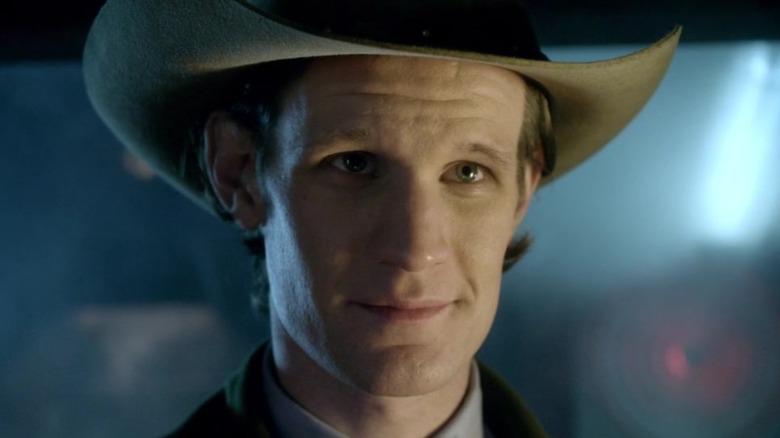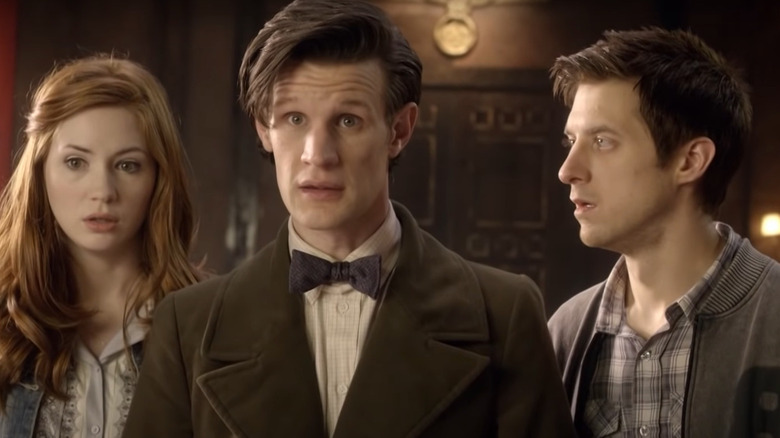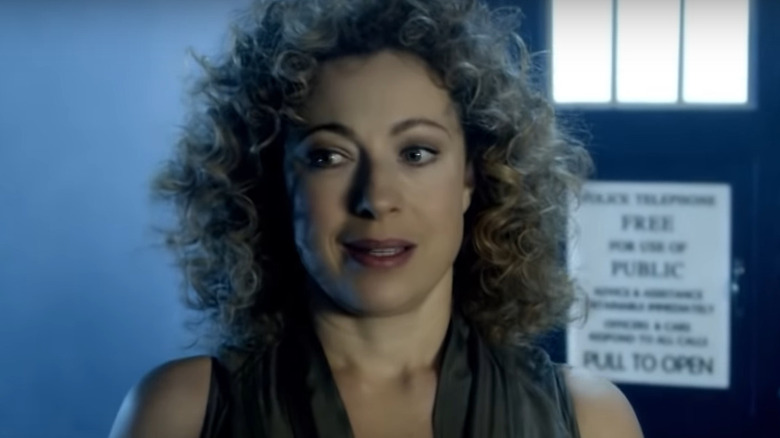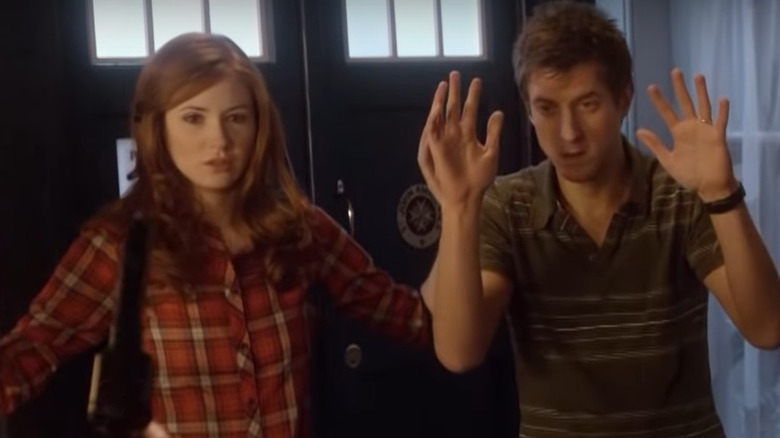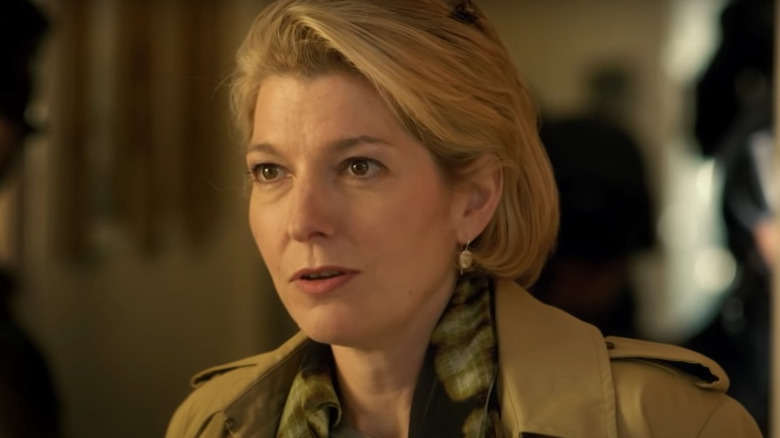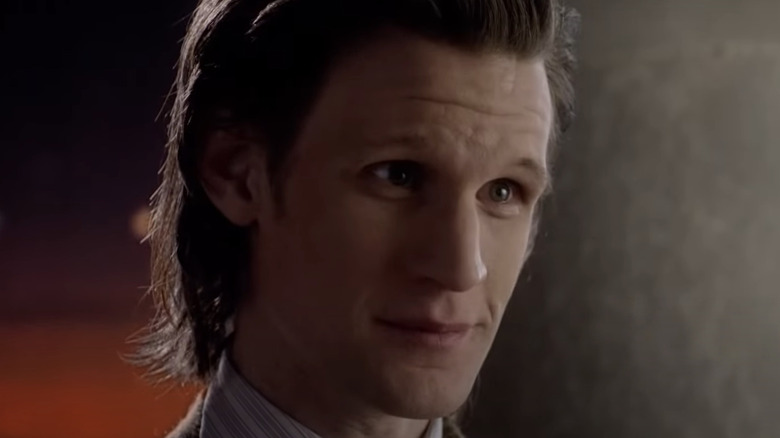The Ending Of Doctor Who Season 6 Explained
The BBC's science-fiction drama "Doctor Who" follows a time-traveling space alien who treats the breadth of existence the same way Ms. Frizzle treats Ralphie's intestines ... that is to say, they both take their magic ride wherever they please, consequences be damned. The space alien in question is the Doctor, the last of the Time Lords, and their magic ride is the TARDIS, a high-tech device forever disguised as a big, blue police box, and together they charm their way into literally everybody's business.
Stories about time travel tend to be confusing even at the best of times, but "Doctor Who" likes to intentionally spice things up with constant retcons and a protagonist who shapeshifts on the regular. So, yeah, it's a little hard to follow from season to season (or series to series, if you're British), and for die-hard fans, that has become part of the fun. Today's guidance comes in the form of clarity for Season 6 of the 2005 revival series, which follows the eleventh iteration of the Doctor (Matt Smith) and depicts a time that he sort of avoided death.
A quick space opera refresher course
Before pressing forward, it's important to catch up on what came before. Season 6 sees the Eleventh Doctor and his newlywed companions, Amy Pond (Karen Gillan) and Rory Williams (Arthur Darvill). Unlike the Doctor, they're just plain, normal people, as far as gingers are considered plain or normal. From time to time, River Song (Alex Kingston) accompanies them as well. She, on the other hand, is anything but normal, but that's information for later.
The trio (and sometimes quartet) go on notable adventures that involve pirates, clones, and Hitler, all the while pondering how to save the Doctor from an assassination attempt, something Amy, Rory, and River witnessed in the first episode of Season 6 (remember, this is time travel, just go with it). Along the way, the Doctor accrues a secondary force of companions in Vastra (Neve McIntosh), Jenny Flint (Catrin Stewart), and Strax (Dan Starkey), a trio stationed in the Victorian Era of London, England.
Season 6 is technically split into two halves, each of which possesses important revelations in their respective finales. There's a lot to cover, so read closely.
River Song is more connected than anyone
Season 5 heavily teased an important connection between River Song and the Doctor, and Season 6 delivers the juicy details by revealing that her arc is pulled directly from every soap opera ever. In the mid-season finale, it comes to light that she's the daughter of Amy and Rory and that, because she was conceived on the TARDIS, she's got some magic Time Lord powers, too. The Silence (a religious cult hellbent on assassinating the Doctor via the most convoluted plots imaginable) trains her from birth to become the perfect killer, so that's another connection for the books. In the true finale, she marries the Doctor –- a natural progression from trying to murder him, obviously -– and that's still not the last of her ties. Since she's Proto Time Lord (part Time Lord, part something else) she can reincarnate, and her second incarnation was Melody Zucker (Nina Toussaint-White), Amy and Rory's childhood friend.
BBC couldn't have tied her to more aspects of these characters' lives if they tried ... and it sure feels like they tried. As River's death was shown in her first appearance across from the Tenth Doctor (David Tennent), and it's known that she's meeting the Doctor in reverse (his first equals her last, it's a time travel thing), seeing her prominent experiences and origins in Season 6 heralds the end of her story arc.
Amy Pond and Rory Williams are ready to settle down
Domestic life comes for us all. There is no stopping it. Some folks just take a more circuitous route to get to it. The course towards the white picket fence for Amy and Rory happened to zigzag across the space and time, but they got there, too. Season 6 shows the couple grappling with personal peace and thrilling adventure. They're the first companions to tell the Doctor that they want to continue exploring the universe but also that they also need to have time away from the danger. It's hilariously awkward to witness them break the news to the Eleventh Doctor like he's a clingy roommate.
Their march to quiet bliss signals the end of their time with the Doctor, but that's not until the mid-season finale of Season 7. Possibly the strangest facet of this is that they fully accept River Song leaving to explore the universe on her own, which is almost in direct opposition to their familial inclinations.
The Eleventh Doctor opens up to his own history
In Season 5, the Eleventh Doctor absconded from all his former compatriots. Everyone who knew him during Seasons 1 through 4 vanished from his life. While it's never fully stated, there's enough evidence to suggest that the Eleventh Doctor craved a new start, unbound from the people who reminded him of his former flame, Rose Tyler (Billie Piper). Of course, BBC could have simply wanted new faces. Hey, if a reboot worked once, right? Season 6 allows the Eleventh Doctor to open up to his past in ways that ultimately paves the way for new characters to become allies.
The prime example of this is the reintroduction of Brigadier General, Sir Allistair Gordon Lethbridge-Stewart (Nicholas Courtney) of UNIT -– think S.H.I.E.LD. –- who aided the Doctor during seasons prior to the 2005 reboot. The character was reintroduced to allow for his canonical death and to respect the passing of his actor, who died in 2011. To continue his character's name, Kate Stewart (Jemma Redgrave), his daughter and also a member of UNIT, was brought in to expand the Doctor's group of allies.
The lore of Trenzalore seals the Doctor's fate
In Season 5, the Silence sabotaged the TARDIS in an effort to kill the Doctor. In doing so, they nearly destroyed the entire expanse of time and space. Hilariously, this was in an effort to stop him from reigniting a war ... that would potentially destroy the entire expanse of time and space, which was foretold in an ancient prophecy ("Doctor Who" is as much a fantasy series as it is a science fiction one). While that particular bomb doesn't drop until the culmination of Season 7, the prophecy of the Doctor's doom falls squarely in Season 6 when he goes searching for the Silence.
That's how the Doctor learns of Trenzalore, a place fated to be his tomb. This seed indicates the beginning of the end for the Eleventh Doctor, whose time will ultimately be similar to the Tenth Doctor's in terms of seasons, but longer than any other modern iteration in terms of canonical chronology. But for the moment, even though it ended, the Eleventh Doctor gets to be happy, gets to be loved, and gets to love in return.
